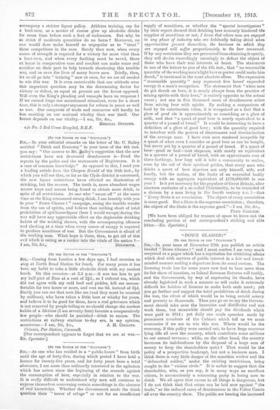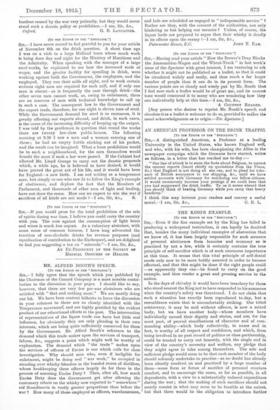"DOWN GLASSES!"
[TO THE EDITOR OP THIO " SPECTATOR.")
SIR,—In your issue of November 27th you publish an article headed " Down Glasses I " and I must confess I am very much surprised at a paper which has a reputation for criticizing affairs which deal with matters of public interest in a fair and broad- minded manner making a departure from its usual custom. The Licensing trade has for some years now had to bear more than its fair share of taxation, as Inland Revenue Returns will testify, and the Government, by way of expressing its thanks, have already legislated in such a manner as will make it extremely difficult for holders of licences to make both ends meet ; yet you go further and suggest the total prohibition of drink during the war, the effect of which would be to bring untold misery and poverty to thousands. Then you go on to say the Govern- ment should take over the breweries and distilleries and not work them, but meanwhile should pay the dividends which were paid in 1914 ; yet daily one reads speeches made by prominent members of the Cabinet which tell us we must economize if we are to win this war. Where would he the economy, if this policy were carried out, to have large concerns lying idle all over the country, which contribute some millions to our annual revenue ; while, on the other hand, the country increases its indebtedness by the disposal of a large sum of money to keep the shareholders quiet ? That would be the policy of a prospective bankrupt, but not a business man. I think there is very little danger of the munition worker and the " debauched soldier," under the existing restrictions, being caught in the " vicious circle." It is unfair to suggest that the shareholder, who, as you say, is in many ways an excellent citizen, is unconsciously a consenting party in luring men to drink. We all agree that excess in all things is dangerous, but I do not think that that crime can be laid now against " the trade," as the reduced cases of drunkenness in the Police Courts all over the country show. The public are bearing the increased burdens caused by the war very patiently, but they would never stand such a drastic policy as prohibition.—I am, Sir, &o.,











































 Previous page
Previous page